 W
WThe presidency of Gerald Ford began on August 9, 1974, when Gerald Ford became President of the United States upon the resignation of Richard Nixon from office, and ended on January 20, 1977, a period of 895 days. Ford, a Republican from Michigan, had served as Vice President of the United States since December 6, 1973, following Spiro Agnew's resignation from that office. The 38th United States president, Ford has the distinction of being the first, and to date the only person to serve as president without being elected to either the presidency or the vice presidency. His presidency ended following his defeat in the 1976 presidential election by Democrat Jimmy Carter.
 W
WThe senior prom of the Holton-Arms School in Bethesda, Maryland for the 1974–75 school year is the only high school dance ever held at the White House. Held on May 31, 1975, it was generally well-received by participants.
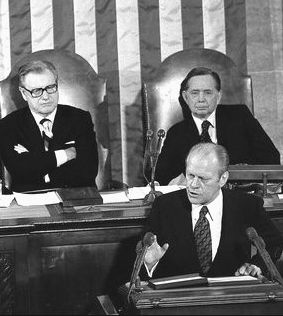 W
WThe 1975 State of the Union address was given by President Gerald Ford to a joint session of the 94th United States Congress on January 15, 1975. The speech was the first State of the Union address of President Ford's tenure as president.
 W
WThe 1976 State of the Union address was given by President Gerald R. Ford to a joint session of the 94th United States Congress on Monday, January 19, 1976.
 W
WIn 1976, an outbreak of the swine flu, influenza A virus subtype H1N1 at Fort Dix, New Jersey caused one death, hospitalized 13, and led to a mass immunization program. After the program began, the vaccine was associated with an increase in reports of Guillain-Barré Syndrome, which can cause paralysis, respiratory arrest, and death. The immunization program was ended after approximately 25% of the population of the United States had been administered the vaccine.
 W
WThe Education for All Handicapped Children Act (sometimes referred to using the acronyms EAHCA or EHA, or Public Law 94-142 was enacted by the United States Congress in 1975. This act required all public schools accepting federal funds to provide equal access to education and one free meal a day for children with physical and mental disabilities. Public schools were required to evaluate children with disabilities and create an educational plan with parent input that would emulate as closely as possible the educational experience of non-disabled students. The act was an amendment to Part B of the Education of the Handicapped Act enacted in 1966.
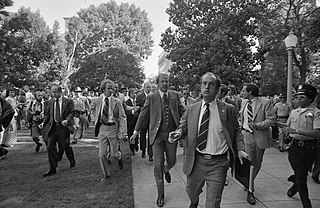 W
WOn September 5, 1975, Lynette "Squeaky" Fromme, a member of the Manson Family cult, attempted to assassinate United States president Gerald Ford in Sacramento, California. She wanted to make a statement to people who refused to halt environmental pollution and its effects on air, trees, water, and animals (ATWA). Although Fromme stood a little more than an arm's length from Ford that Friday morning and pointed a M1911 pistol at him in the public grounds of the California State Capitol building, she had not chambered a round, the gun did not fire, and no one was injured. After the assassination attempt, Ford continued to walk to the California state house, where he met with Governor Jerry Brown. For her crime, Fromme spent 34 years in prison and was released on August 14, 2009 – two years and seven months after Ford's death. The Gerald R. Ford Presidential Museum in Grand Rapids, Michigan, later received the M1911 pistol used in the assassination attempt as a gift, and the gun was put on display.
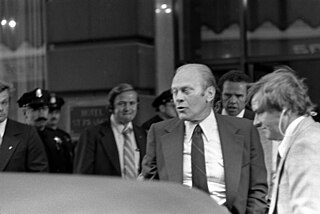 W
WOn September 22, 1975, Sara Jane Moore attempted to assassinate Gerald Ford in San Francisco. Moore fired two gunshots at President Ford, both of which missed.
 W
WThe foreign policy of the Gerald Ford administration was the foreign policy of the United States from August 1974 to January 1977, when Gerald Ford served as president.
 W
WOperation Frequent Wind was the final phase in the evacuation of American civilians and "at-risk" Vietnamese from Saigon, South Vietnam prior to the takeover of the city by the North Vietnamese People's Army of Vietnam (PAVN) in the Fall of Saigon. It was carried out on 29–30 April 1975, during the last days of the Vietnam War. More than 7,000 people were evacuated by helicopter from various points in Saigon. The airlift resulted in a number of enduring images.
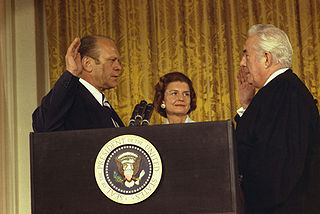 W
WThe inauguration of Gerald Ford as the 38th President of the United States was held on Friday, August 9, 1974, in the East Room of the White House in Washington, D.C., after Richard Nixon, the 37th President, resigned due to the Watergate scandal. The inauguration – the last non-scheduled, extraordinary inauguration to take place in the 20th century – marked the commencement of Gerald Ford's only term as President. Chief Justice Warren E. Burger administered the oath of office. The Bible upon which Ford recited the oath was held by his wife, Betty Ford, open to Proverbs 3:5–6. Ford was the ninth Vice President of the United States to succeed to the presidency intra-term, and he remains the most recent to do so.
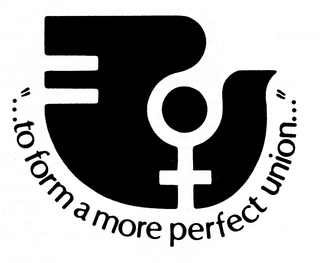 W
WThe National Commission on the Observance of International Women's Year was a presidential commission created by Gerald Ford on January 9, 1975 to promote the national observance in the United States of International Women's Year. The commission was tasked with "encouraging cooperative activity in the field of women's rights and responsibilities" in conjunction with International Women's Year, which had been declared by the United Nations in 1972. It was established by Executive Order 11832 and originally composed of 35 private citizens appointed by the president.
 W
WThe pardon of Richard Nixon was a presidential proclamation issued by President of the United States Gerald Ford on September 8, 1974. By it, Ford granted to Richard Nixon, his predecessor, a full and unconditional pardon for any crimes that he might have committed against the United States as president. In particular, the pardon covered Nixon's actions during the Watergate scandal. In a televised broadcast to the nation, Ford, who had succeeded to the presidency upon Nixon's resignation, explained that he felt the pardon was in the best interests of the country and that the Nixon family's situation was "a tragedy in which we all have played a part. It could go on and on and on, or someone must write the end to it. I have concluded that only I can do that, and if I can, I must."
 W
WThe Space Race was a 20th-century competition between two Cold War rivals, the Soviet Union (USSR) and the United States (US), to achieve firsts in spaceflight capability. It had its origins in the ballistic missile-based nuclear arms race between the two nations following World War II. The technological advantage required to rapidly achieve spaceflight milestones was seen as necessary for national security, and mixed with the symbolism and ideology of the time. The Space Race led to pioneering efforts to launch artificial satellites, uncrewed space probes of the Moon, Venus, and Mars, and human spaceflight in low Earth orbit and to the Moon.
 W
WThe United States President's Commission on CIA Activities within the United States was set up under President Gerald Ford in 1975 to investigate the activities of the Central Intelligence Agency and other intelligence agencies within the United States. The commission was led by the Vice President, Nelson Rockefeller, and is sometimes referred to as the Rockefeller Commission.
 W
WThe Vietnam Civil War, also known as the Second Indochina War, and in Vietnam as the Resistance War Against America or simply the American War, was a conflict in Vietnam, Laos, and Cambodia from 1 November 1955 to the fall of Saigon on 30 April 1975. It was the second of the Indochina Wars and was officially fought between North Vietnam and South Vietnam. North Vietnam was supported by the Soviet Union, China, and other communist allies; South Vietnam was supported by the United States, South Korea, the Philippines, Australia, Thailand, and other anti-communist allies. The war, considered a Cold War-era proxy war by some, lasted 19 years, with direct U.S. involvement ending in 1973, and included the Laotian Civil War and the Cambodian Civil War, which ended with all three countries becoming communist in 1975.
 W
WWhip Inflation Now (WIN) was a 1974 attempt to spur a grassroots movement to combat inflation in the US, by encouraging personal savings and disciplined spending habits in combination with public measures, urged by U.S. President Gerald Ford. The campaign was later described as "one of the biggest government public relations blunders ever".
 W
WThe desk in Vice President's Room of the United States Capitol, colloquially known as the Wilson desk, is a large mahogany desk used by Presidents Richard Nixon and Gerald Ford in the Oval Office as their Oval Office desk. One of only six desks used by a President in the Oval office, it was purchased between 1897 and 1899 by Garret Augustus Hobart, the 24th Vice President of the United States, for the Vice President's Room in the United States Capitol.
 W
WBilly Zeoli was an American evangelical leader, speaker and media executive from Grand Rapids, Michigan. Zeoli served as the White house chaplain to U.S. President Gerald R. Ford and Betty Ford during the mid-1970s offering counsel on national spiritual matters, and acting as spiritual counselor to President Ford. In the 1960s, Zeoli was an early organizer of what would become Baseball Chapel, a Christian organization that provides professional Baseball players, and other athletes, Sunday church services in their locker rooms before sporting events. Zeoli was perhaps most remembered as the long-standing president of Gospel Films Inc, later becoming Gospel Communications Inc, a leading Christian media company that distributed media and promoted ministry outreach around the world. Zeoli held the position from 1962 until he retired from the organization in 2006.